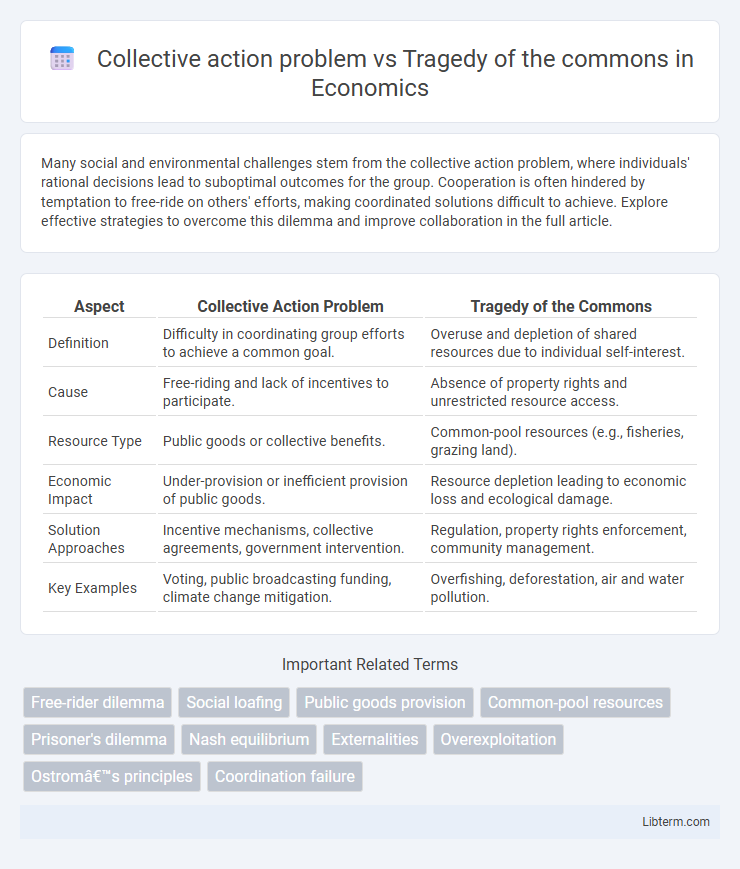Many social and environmental challenges stem from the collective action problem, where individuals' rational decisions lead to suboptimal outcomes for the group. Cooperation is often hindered by temptation to free-ride on others' efforts, making coordinated solutions difficult to achieve. Explore effective strategies to overcome this dilemma and improve collaboration in the full article.
Table of Comparison
| Aspect | Collective Action Problem | Tragedy of the Commons |
|---|---|---|
| Definition | Difficulty in coordinating group efforts to achieve a common goal. | Overuse and depletion of shared resources due to individual self-interest. |
| Cause | Free-riding and lack of incentives to participate. | Absence of property rights and unrestricted resource access. |
| Resource Type | Public goods or collective benefits. | Common-pool resources (e.g., fisheries, grazing land). |
| Economic Impact | Under-provision or inefficient provision of public goods. | Resource depletion leading to economic loss and ecological damage. |
| Solution Approaches | Incentive mechanisms, collective agreements, government intervention. | Regulation, property rights enforcement, community management. |
| Key Examples | Voting, public broadcasting funding, climate change mitigation. | Overfishing, deforestation, air and water pollution. |
Introduction to Collective Action Problem and Tragedy of the Commons
The collective action problem arises when individuals in a group face difficulties coordinating to achieve a common goal despite shared interests, often leading to under-provision of public goods. The tragedy of the commons describes a specific type of collective action problem where individuals overuse a shared resource, causing its depletion and harm to all users. Both concepts illustrate challenges in managing resources and cooperation within groups, highlighting the tension between individual incentives and collective welfare.
Defining the Collective Action Problem
The collective action problem occurs when individuals in a group face challenges in coordinating efforts to achieve a shared goal due to conflicting interests or incentives. Unlike the tragedy of the commons, which highlights resource depletion through unregulated access, the collective action problem emphasizes barriers to cooperation even when cooperation benefits all participants. Effective solutions often require mechanisms for incentivizing collaboration and overcoming free-rider issues.
Understanding the Tragedy of the Commons
The Tragedy of the Commons describes a scenario where individual users, acting in their own self-interest, deplete a shared resource, leading to long-term collective loss. This problem arises because each participant receives the full benefit of their exploitation but only a fraction of the cost of resource degradation. Understanding this dynamic highlights the need for effective management strategies to balance individual incentives with sustainable resource usage, distinguishing it from broader collective action problems that may involve coordination challenges beyond resource depletion.
Key Differences Between the Two Concepts
The collective action problem arises when individuals fail to contribute to a common goal due to incentives for free-riding, whereas the tragedy of the commons describes the overuse and depletion of shared resources caused by individual self-interest. Collective action problems emphasize coordination and cooperation challenges in achieving public goods, while tragedy of the commons highlights environmental degradation resulting from unrestricted access to common-pool resources. Key differences include the nature of the resource involved, the type of social dilemma, and the mechanisms required to resolve each issue.
Historical Examples Illustrating Each Concept
The Collective action problem is exemplified by the 19th-century labor union movements, where workers struggled to unite for better wages despite shared interests, highlighting coordination challenges. The Tragedy of the Commons is historically illustrated by the overgrazing of the New England commons during colonial America, showcasing how individual self-interest depletes shared resources. Both concepts reveal fundamental conflicts in managing shared resources and coordinating group efforts across different societal contexts.
Causes and Consequences of Collective Action Problems
Collective action problems arise when individuals face incentives to free-ride on the efforts of others, leading to under-provision of public goods or overuse of common resources. The primary cause is the misalignment between individual rationality and group benefit, often exacerbated by lack of communication, trust, or enforcement mechanisms. Consequences include resource depletion, reduced social welfare, and failure to address shared challenges such as climate change or public health crises.
Environmental Impacts of the Tragedy of the Commons
The tragedy of the commons occurs when individuals overuse and deplete shared environmental resources, leading to long-term ecological degradation such as deforestation, overfishing, and pollution. Collective action problems hinder effective management of common-pool resources because individuals prioritize personal gain over collective sustainability. Addressing these challenges requires robust governance mechanisms, community cooperation, and enforcement of regulations to mitigate environmental impacts and ensure resource preservation.
Solutions and Policy Interventions
Solutions to the collective action problem and the tragedy of the commons often involve establishing clear property rights and creating enforceable regulations to manage resource use sustainably. Policy interventions include implementing quota systems, collective agreements, and economic incentives such as taxes or subsidies to align individual behavior with long-term group benefits. Institutional frameworks that promote cooperation, transparency, and monitoring have proven effective in overcoming challenges related to resource overuse and free-rider dilemmas.
Role of Governance and Community Management
Effective governance and community management are critical in addressing both the collective action problem and the tragedy of the commons by establishing clear rules, monitoring usage, and enforcing sanctions to prevent overexploitation of shared resources. Strong institutions facilitate coordination among individuals, aligning incentives for sustainable resource use and mitigating free-rider issues inherent in collective action dilemmas. Community-driven governance fosters trust and cooperation, enabling adaptive management and reinforcing social norms that sustain common-pool resources over time.
Future Directions for Addressing Shared Resource Challenges
Future directions for addressing shared resource challenges include integrating adaptive governance frameworks that promote localized decision-making and stronger cooperation among stakeholders. Advances in technology, such as real-time monitoring and blockchain, enable transparent management and equitable resource allocation, mitigating both collective action problems and the tragedy of the commons. Emphasizing interdisciplinary research and policy innovation enhances resilience by aligning economic incentives with sustainable resource use.
Collective action problem Infographic

 libterm.com
libterm.com